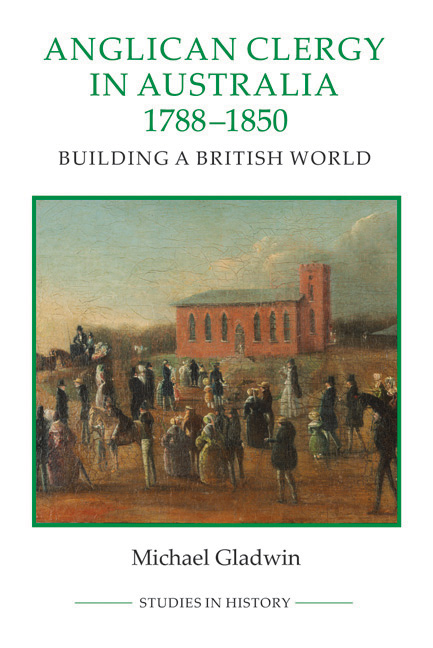Book contents
- Frontmatter
- Dedication
- Contents
- List of illustrations
- Acknowledgements
- Abbreviations
- Map
- Introduction
- PART I SINEWS: FUNDING, RECRUITMENT, BACKGROUNDS AND MOTIVATION, 1788-1850
- PART II CLERGYMEN IN COLONIAL AUSTRALIA, 1788-1850
- 4 Ecclesiastical roles: rites of passage and public worship
- 5 Flogging parsons? Chaplaincy, the magistracy and civil roles
- 6 Clergy, culture and society
- 7 Clergy and indigenous peoples
- PART III SCENES OF COLONIAL CLERICAL LIFE: AUSTRALIAN CLERGYMEN AND VOLUNTARISM, 1836-50
- Conclusion
- Bibliography
- Index
7 - Clergy and indigenous peoples
from PART II - CLERGYMEN IN COLONIAL AUSTRALIA, 1788-1850
Published online by Cambridge University Press: 05 December 2015
- Frontmatter
- Dedication
- Contents
- List of illustrations
- Acknowledgements
- Abbreviations
- Map
- Introduction
- PART I SINEWS: FUNDING, RECRUITMENT, BACKGROUNDS AND MOTIVATION, 1788-1850
- PART II CLERGYMEN IN COLONIAL AUSTRALIA, 1788-1850
- 4 Ecclesiastical roles: rites of passage and public worship
- 5 Flogging parsons? Chaplaincy, the magistracy and civil roles
- 6 Clergy, culture and society
- 7 Clergy and indigenous peoples
- PART III SCENES OF COLONIAL CLERICAL LIFE: AUSTRALIAN CLERGYMEN AND VOLUNTARISM, 1836-50
- Conclusion
- Bibliography
- Index
Summary
In his survey of the devastating encounter between European colonisers and Australia's indigenous peoples, John Harris concluded that for many years the role of the Anglican Church ‘was neither to inspire the nation nor to stir its conscience, but to maintain silence’. Little was done to ‘halt the destruction of Aboriginal culture, or promote an understanding of what it represented’. For most Anglican clergymen the period was indeed marked by silence and inactivity. Nowhere is this more apparent than in Tasmania, where clergy (and most laity) offered little public comment on the brutal suppression of Aborigines whose population was reduced by 90 per cent within twenty years. Anglican chaplains sat on governor Arthur's ‘token’ Aborigines Committee, but the tenor of the practice and sentiment of the senior colonial chaplain, William Bedford, is evident in his public prayer that sought both the success of Arthur's infamous ‘Black Line’ military operation against Aborigines, and the Aborigines' conversion to Christianity. A tiny remnant was exiled to Flinders Island, where the Revd Edward Freeman's visits and admonishments against drunkenness and immorality were little appreciated, in part because the Aborigines of Flinders Island disliked him. Later clergymen such as Gell and Braim were interested in Aboriginal anthropology and mourned the demise of the Aboriginal population in Tasmania. But by then such an interest was largely academic.
Silent complicity is also evident in the Port Phillip provincial press. The Revd James Wilson's editorial line in the Portland Guardian of the early 1840s – deploring ‘outrages’ committed by Aborigines upon settlers – clearly sided with the latter. Most conspicuously, Marsden contributed little to positive relations between Aborigines and settlers, even discouraging missionary efforts among Aborigines. Marsden's persistent pessimism regarding Aboriginal potential for Christianisation or ‘civilisation’ stands in stark contrast to his herculean missionary labours for the settled, agrarian Māori.
- Type
- Chapter
- Information
- Anglican Clergy in Australia, 1788–1850Building a British World, pp. 153 - 162Publisher: Boydell & BrewerPrint publication year: 2015

